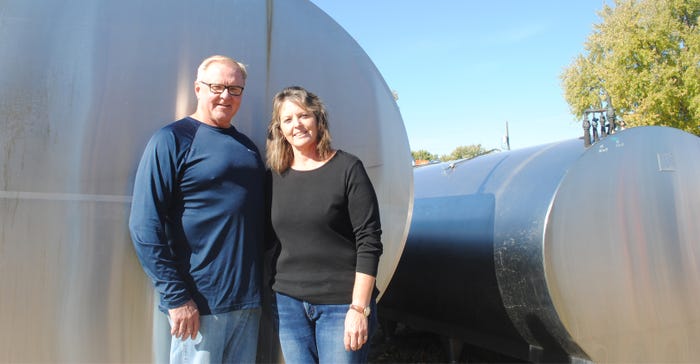
Dallas and Suzanne Schweitz may travel all over the continent salvaging and marketing used milk bulk tanks and dairy equipment for their Salvage House and Schweitz Dairy Equipment business, but their roots run deep at their headquarters in downtown Fullerton, Neb.
Dairying is in Dallas’ blood. In fact, he likes to pull out a Jan. 5, 1957, article from Nebraska Farmer that featured his father, Ted, as one of the first dairy producers in the area to learn how to artificially inseminate cows and make that service commercially available to neighboring dairy producers.
The old NF article, written by Dick Coffey, includes a Schweitz family photo around the dinner table, with 1-year-old Dallas in the high chair with his parents and siblings gathered around for a meal.
Today, Dallas and his wife continue to visit with dairy farmers every day, buying used equipment from barns across the country and marketing them to other dairies and growing new industries. But you can’t tell the story of Dallas and Suzanne without first telling Ted’s story.
The elder Schweitz went to school in 1954 to learn about AI to use the service in the family’s Grade A dairy herd. He had farm payments due at the time, so he hoped to provide AI service to other producers in Boone and Nance counties, and earn extra income to make the payments. At the time, he was servicing up to 26 cows a week.
“He thought that providing AI services was beneficial to the small dairies in particular, because it brought superior genetics to those farms without them having to own the bulls,” Dallas recalls. “After being successful with the AI business, Surge dairy equipment contacted him about becoming a dealer.”
While working on the farm and offering the AI service, Ted eventually bought a building on Third Street in Fullerton for the dealership.
Dallas began in that same business in the same building in 1982. With the decrease in dairies across the nation, they transitioned into used dairy equipment 11 years later. This move has led the couple to old barns in remote places all across the U.S. in search of equipment that can be reused.
“Things have really changed on the farm in the last 50 to 60 years,” Dallas says. “Eggs and cream used to bring in the cash years ago,” he explains. “Dairying has gone a lot like other parts of agriculture. Farmers need to upgrade their facilities to comply with stricter regulations.”
Dairy farmers often retire, without any relative willing and able to take on the dairy operation.
Looking at their inventory list online and their large lot across the street from the headquarters building, it is easy to see the diversity in the equipment the company is able to carry. They have bulk tanks, cooling equipment and other milking equipment from Surge, Bou-Matic, DeLaval, Westfalia and Beco, along with generators.
The older equipment bought by the company can find a new home in new markets. “We can sell an older, small bulk tank to someone who is milking 10 cows in a certified organic operation and marketing the milk locally,” Dallas says. “Even tanks from the 1960s and early 1970s that are in good shape can go into use by someone else.”
They often travel to traditional dairy regions like Wisconsin, but they also travel to the East and West coasts, especially into California, as well as Texas for salvage and delivery jobs. Nearly one-third of the equipment they sell does not go back into the dairy industry, but will be put to use in other growing industries, such as craft breweries and wineries.
Fullerton is no longer the dairy hub it once was in the 1950s when Ted was milking cows and working as an AI provider and Surge dealer. Back then, practically every farmer had a few milk cows. But Dallas and Suzanne are keeping up with the dairying tradition in their building on Third Street in Fullerton by purchasing dairy equipment from barns across the country to be put to new use in dairies and in upcoming industries. You can learn more at salvagehouse.net.
About the Author(s)
You May Also Like






